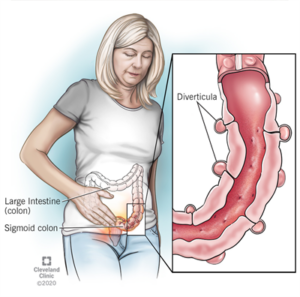
Diverticula are tiny pockets that form in the wall of your colon. They can become inflamed and infected, causing symptoms and sometimes serious problems including bleeding, blockages and abscesses. Source: Cleveland Clinic
Patients with right colon diverticulitis can consider minimally invasive surgery a safe, feasible treatment option, according to a recent study.
The retrospective cohort study published in Surgical Endoscopy compared the short-term outcomes for open surgery versus minimally invasive approaches for right colon diverticulitis, a rare disease process for which there are no established treatment guidelines. Outcomes following surgical management are underreported in the literature.1
Walter Reed National Military Medical Center-led researchers found statistically significant postoperative outcomes in open surgery versus minimally invasive approaches for demonstrated cardiac events, pulmonary events, postoperative sepsis and prolonged ileus. The average length of stay was also longer in open surgery (11.5 days) versus minimally invasive surgery (5.9 days).
“We demonstrate that, despite longer mean operative times, minimally invasive surgery provides equivalent or improved morbidity with a shorter average hospital stay and acceptable conversion rate compared to open surgery for patients undergoing ileocecectomy for right colon diverticulitis,” co-author Matthew Ng, MD, an assistant clinical professor of colon and rectal surgery at the George Washington University School of Medicine & Health Sciences and colon and rectal surgeon at GW Cancer Center, told U.S. Medicine. “Therefore, patients requiring operative management for this disease process should be offered a minimally invasive approach whenever feasible.”
Data was gathered from the American College of Surgeons National Surgical Quality Improvement Program (NSQIP) Targeted Colectomy database for patients with a diagnosis of diverticulitis of the colon who underwent either open or minimally invasive ileocecectomy between 2012 and 2019. Patients were considered to have a diagnosis of right-sided diverticulitis if they had a primary pre- and postoperative diagnosis of diverticulitis (ICD9 code 562.1 or ICD10 code K57, K57.3, K57.32, or K57.92) combined with the primary procedure code for either open (44,160) or laparoscopic (44,205) ileocecectomy (including laparoscopic and robotic-assisted cases), Ng explained in an email.
Patients with ascites, disseminated cancer, American Society of Anesthesiologists (ASA) Class 5 and those requiring mechanical ventilation were excluded. Preoperative, intraoperative and 30-day postoperative outcomes were compared between the groups.
Minimally Invasive
Of the 484 patients who met the inclusion criteria, 150 patients (31%) underwent open surgery, and 334 patients (69%) underwent minimally invasive surgery with an 18% conversion rate (minimally invasive surgery to open surgery). Seventy-one percent of the patients were white, 11% were Black, 7% were Hispanic, and 5% were Asian. The indication for surgery differed significantly by approach. Acute diverticulitis represented 47% of indications for open surgery cases and 25% of minimally invasive surgery cases (p < 0.0001), according to the study.
Patients who received open surgery were most likely to be older, Black or ASA Class 3 or 4; have diabetes, preoperative sepsis or anemia; take preoperative steroids and undergo emergency surgery. Patients undergoing minimally invasive surgery were more likely to have independent functional status or have an ASA Class 1 or 2.
There were no significant differences between cohorts based on sex, history of smoking, chronic obstructive pulmonary disease, congestive heart failure, hypertension, dialysis use, bleeding predisposition, obesity and serum albumen less than 3.5.
The study concluded that minimally invasive surgery is a safe and feasible option for diverticulitis, Ng wrote in an email.
Patients undergoing open surgery had a significantly higher chance of post-operative sepsis (p = 0.009) and ileus (p = 0.04) compared with minimally invasive surgery. Hospital length of stay also was significantly shorter after minimally invasive surgery compared to open surgery (5.9 days versus 11.5 days; p < 0.0001). The mean operative time was significantly longer in minimally invasive surgery than open surgery (173 minutes versus 198 minutes; p = 0.001).
Over the past few decades, diverticular disease of the colon has become a major source of illness and healthcare costs in industrialized nations. Right colon diverticulitis accounts for only 1% to 5% of all diverticulitis cases in the Western Hemisphere, but up to 75% of diverticulitis in Asian countries. Differences in congenital factors, diet, gut microbiota or environment are believed to play a role. In this study of patients in the Western Hemisphere, a minority of patients requiring operative therapy were of Asian descent, unlike other countries, where the prevalence of right colon diverticulitis is higher.
Since there are no current guidelines for the management of right colon diverticulitis, treatment often is inferred from the management of left-sided disease. As with left-sided disease, most patients will initially undergo nonoperative management with intravenous antibiotics. For a small percentage of patients who either fail antibiotic therapy or have complications or recurrence, surgical therapy with ileocecectomy or right colectomy may be required.
“Our study is one of the largest cohort studies to evaluate patients undergoing surgery for right colon diverticulitis in the United States and adds to the paucity of literature on this subject in Western populations,” Ng explained.
- Horsey ML, Amdur R, Ng M, Obias VJ. Short-term outcomes following resection of right colon diverticulitis: a comparison of open and minimally invasive approaches using the NSQIP database. Surg Endosc. 2022 Jun;36(6):4283-4289. doi: 10.1007/s00464-021-08771-w. Epub 2021 Oct 25. PMID: 34697680.
- Cleveland Clinic, Diverticulosis and Diverticulitis of the Colon. 04/01/2020 Accessed: Sept. 23, 2022; https://my.clevelandclinic.org/health/diseases/10352-diverticular-disease

